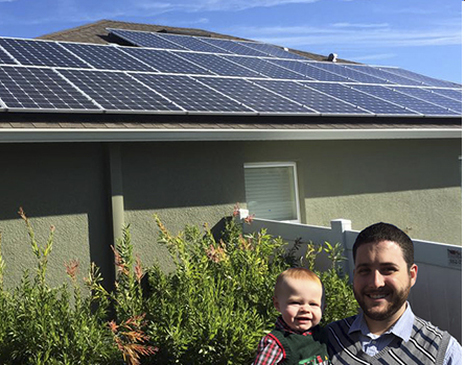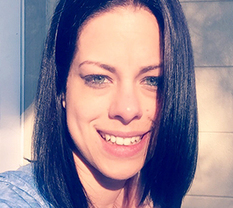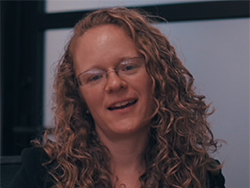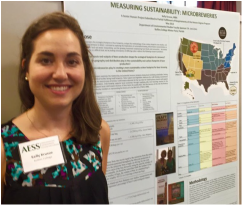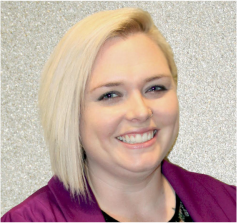|
Justin Allender and his son at their home fitted out with solar panels financed by a First Green Bank no-interest loan offered to employees to incentivize them to retrofit their homes with renewable energy.
"Where you keep your money makes a difference."
Creating in-house spokespersons for First Green Bank's regenerative values
"At the end of the day we offer the same products as every other bank but the way we go about promoting our values is completely different. It’s about being flexible, and listening to your colleagues, and listening to your clients and being able to be nimble enough to make change. ""I grew up mostly conservative but I think the basis of conservative is conservation and I think it is our responsibility to protect the environment. I am not saying we put the environment ahead of the economy but I am talking about making ethical and moral decisions as part of our economic decisions." |
the challenge: creating a holistic-value banking culture
A First Green Bank Credit Analyst Reflects on Values-Based Banking
Justin Allender, a Florida native, earned his MBA in 2010 from Florida State University and joined First Green Bank as a credit analyst in the spring of 2014 after having spent three years as a retail relationship banker at JP Morgan Chase. He was chosen through a highly selective process by the Global Alliance for Banking on Values to attend their Leadership Academy this coming year.
We talked with Justin about his varied banking experiences, what he hopes to take back to First Green Bank from the GABV Academy, and the challenges and opportunities a values-based bank faces in Central Florida. You say you enjoyed your stint at JP Morgan Chase and learned a lot from the experience. Your career path was looking bright with the bank — you had earned a 5 out of 5 at his last annual review. What made you decide to look for an alternative banking career? I guess you could say I was feeling the weight of the behemoth, like I was just a cog in the wheel. JP Morgan is very good at doing what they do but they didn’t encourage you to ask questions or to see the why behind what they do. At First Green Bank it was so different from the very beginning. It is such a small company; we now have maybe 72 employees. I meet with the CEO Ken LaRoe once a week and I get to tap into his head and see how he is making decisions. At the end of the day we offer the same products as every other bank but the way we go about promoting our values is completely different. It’s about being flexible, and listening to your colleagues, and listening to your clients and being able to be nimble enough to make change. It has been really refreshing. Ken is really big about the triple bottom line whereas every place else I have ever worked it is about how do we increase shareholder value, how do we eke out one extra penny of interest from John Smith who has been paying his mortgage for 25 years?
At First Green Bank we encourage people to do the right thing for the environment, we offer our customers discounts for making better construction decisions when they build their homes. And we are the only bank in Central Florida and one of only a very few in the states that offer incentives to take out loans for solar panels. Most other banks say do a home equity line of credit, which ten years ago would have been fine, but Florida had a huge downturn in home values just 8 years ago so for a lot of people that is not an option anymore. The bank also offers incentives to encourage employees to buy into the mission. I recently had solar panels put on my home because the bank offers employees zero percent loans to us to do that. I don’t work directly with clients but sometimes someone will introduce me to a client and say, “we have someone here who has done all this research on solar installation. “ So I am able to champion the loan product. What do you see as the challenge doing business as a values-based bank in a part of the country that has not always been particularly hospitable to environmental and social causes? I feel like sometimes the hardest part about translating our green mission in these parts is that people feel they are being lectured to or told what to think. But if they just sat down and thought about it for themselves they would realize that, yes, I would like to have cleaner air or buy less gas and have a little bit of extra money in my pocket at the end of the month. So I like how our bank goes about doing it without lecturing. Sometimes I also feel political ideology plays into the equation and people assume because First Green Bank cares about the environment they automatically label us as a liberal bank. I grew up mostly conservative but I think the basis of conservative is conservation and I think it is our responsibility to protect the environment. I am not saying we put the environment ahead of the economy but I am talking about making ethical and moral decisions as part of our economic decisions. The challenge we face is trying to grow the economy responsibly. Our economy in Central Florida is very tied to tourism. Se we try to work with our clients in the industry to help them make small changes to be a bit more green. I work in the lending department and we don’t want to be the bank that finances giant homes on lots that require thousands of gallons to do their landscaping. Our aquifer is facing a lot of challenges; it is made of very porous limestone so when there is no fresh water in it to create pressure the salt water from the ocean can flow in. Once you have salt water in that aquifer you can’t use it any more. It is a huge challenge.
The mission of the GABV Leadership Academy is to groom the future leaders of its member organizations and to help them be more effective communicators of the values of regenerative banking, with their associates, their clients, and their larger communities. What are you hoping to learn from this experience with the Academy? A lot of our GABV member banks face similar challenges to ours at First Green Bank in that they have a few key people who really buy into the values while others may not be as focused on it. I am hoping I can bring back more of that values story and encourage people to buy into it. I want to show people that our values are not just about being green, it isn’t just a gimmick, but a way of living, of conducting business, a way of being a responsible member of your community, and that being green doesn’t mean you have to believe one particular ideology, it is just the right thing to do. |
"I am very excited to see how we can change our community not just by being the green bank but the one that the community comes to depend on." |
I am very excited to see how we can change our community not just by being the green bank but the one that the community comes to depend on.
I am hoping to learn from others’ experiences in GABV. There are banks that have been around over 100 years like Crédit Coopératif, they have been mission-minded since they began operations.
We have this whole battle in the US Congress and in public opinion about are corporations people? I guess my way of looking at is if you are going to have giant corporations who can make decisions “as people” that can sometimes affect you negatively, then you need someone in your corner who can have a positive effect. So if we at First Green Bank are “a person,” hopefully we are a good person. |
more on creating a holistic value banking culture:
|
